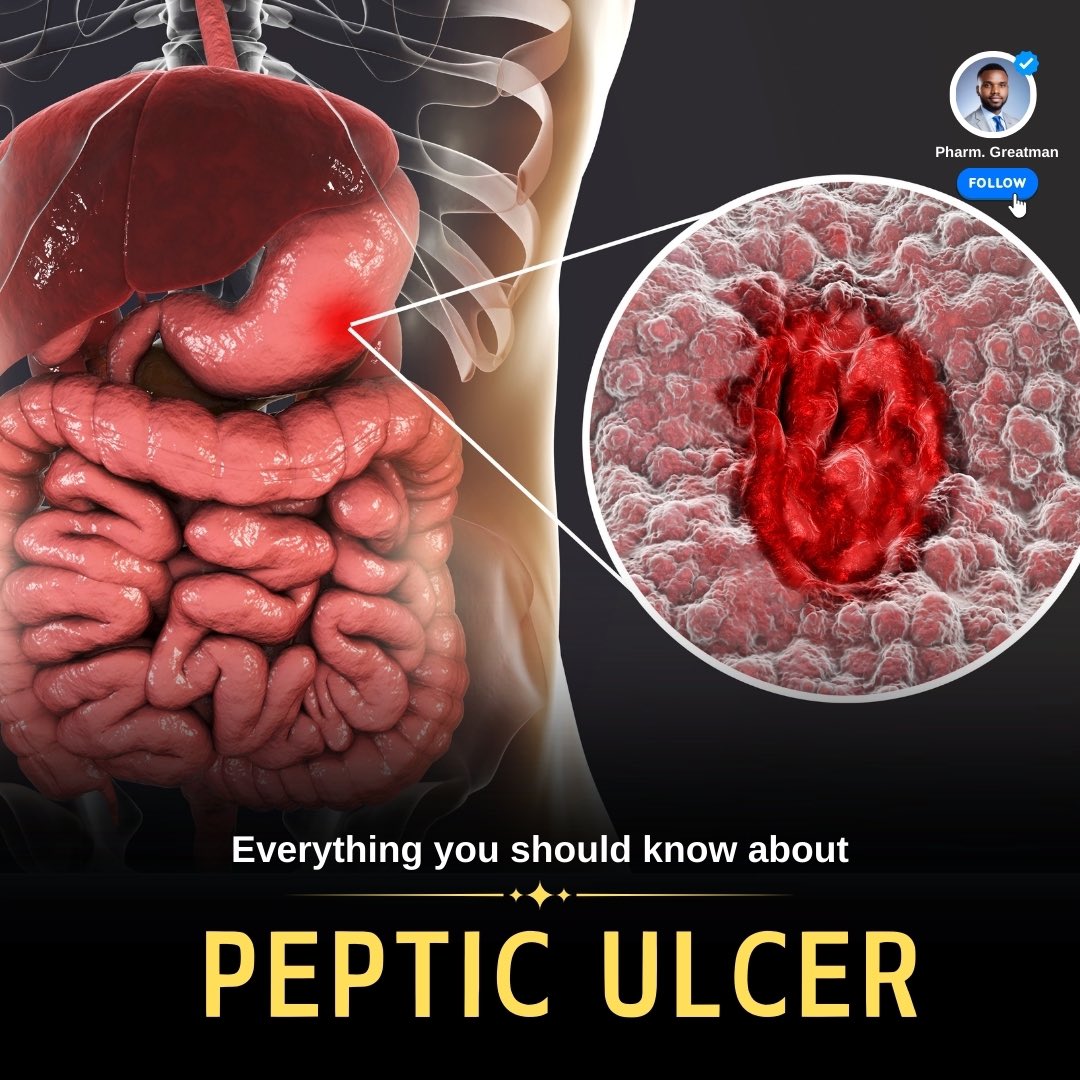This is the most comprehensive thread you’ll read on peptic ulcers!
From causes to symptoms, treatments, and prevention tips, everything you need to know is right here.
A peptic ulcer is a type of sore that develops in the lining of your stomach or the upper part of your small intestine (called the duodenum)
This happens when the protective lining of your stomach or intestine gets damaged, leaving the area exposed to stomach acid.
Below are the causes, symptoms, and available treatments for peptic ulcers.
✍🏽 WHAT CAUSES PEPTIC ULCER?
– Infection by H.pylori bacteria is a common bacterial infection that weakens the protective lining of the stomach, allowing stomach acid to cause sores (ulcers). It’s one of the main causes of peptic ulcer
– Painkillers like aspirin, ibuprofen, and naproxen, when taken for long periods, can damage the stomach’s lining, leading to ulcers.
– The stomach naturally produces acid to help digest food, but when there’s too much acid, it can damage the stomach lining, leading to ulcers.
Did you know that people produce more acid than others due to genetics, stress, or disease conditions
– Smoking, excessive alcohol use, and high levels of stress don’t directly cause ulcers but can make existing ulcers worse by irritating the stomach lining and increasing acid production.
✍🏽 PEPTIC ULCER SYMPTOMS
– The most common symptom, often described as a burning or gnawing pain in the upper abdomen. This pain may come and go and is typically worse when the stomach is empty
READ ALSO :#HealthZone : simple and effective ways to keep your heart strong and healthy
– Many people with ulcers feel bloated, and they may experience burping, nausea, or an upset stomach after eating.
– Some people with ulcers feel nauseous, especially after eating, and may even vomit in more severe cases.
– You may experience unexplained weight loss, possibly because eating may become uncomfortable due to the pain.
– If the ulcer causes bleeding, it can lead to black, tarry stools or blood in the vomit.
SOME FOODS CAN WORSEN THE SYMPTOMS
– Spicy foods like chili peppers 🌶️ , hot sauces, and similar spicy foods
– Fried and fatty foods like fries, chips, or heavy meats take longer to digest, increasing acid production
– Oranges 🍊 , lemons, and other citrus fruits are highly acidic and can aggravate ulcer symptoms.
– Tomato-based 🍅 products like sauces, ketchup, and even raw tomatoes can irritate the stomach
– Coffee ☕️ , tea, and caffeinated sodas can increase stomach acid production
– Alcohol, Chocolate and carbonated drinks also made this list 😃
✍🏽 HOW IS PEPTIC ULCER DIAGNOSED
– Endoscopy where a thin tube with a camera is inserted into the stomach through the mouth to examine the stomach lining
– Blood tests, breath tests, stool tests to test for H. pylori
– Xray and CT scans
✍🏽 TREATMENT OF PEPTIC ULCER
– Lifestyle changes is very important: reducing alcohol intake, quitting smoking, and managing stress are key to preventing ulcers from getting worse or recurring.
READ ALSO :#HealthZone : 4 Stages of Prostrate Cancer, Remedies & Symptoms
– If the ulcer is caused by an H. pylori infection, antibiotics are prescribed to eliminate the bacteria.
– Proton pump inhibitors (PPIs) are given to reduce the amount of acid the stomach produces, allowing the ulcer to heal
– Antacids help neutralize stomach acid or reduce acid production to relieve pain and discomfort. But don’t take antacids at same time with other medications
– Stop using painkillers anyhow (NSAIDs): If the ulcer is caused by NSAIDs, stopping these medications or switching to a different type of pain reliever may be necessary. See your Pharmacist for options.
IT CAN GET COMPLICATED
– Bleeding, because ulcer can lead to significant blood loss, which might result in symptoms like fainting, dizziness, or anemia.
– In severe cases, the ulcer can create a hole in the stomach or intestine, leading to infection in the abdominal cavity (peritonitis), which requires emergency treatment.
– Swelling from an ulcer can block food from passing through the digestive tract, leading to severe vomiting and weight loss.
✍🏽 HOW TO PREVENT PEPTIC ULCER
– Avoid long-term use of NSAIDs or use the lowest effective dose
– Limit alcohol intake and quit smoking.
– Manage your stress through relaxation techniques, exercise, or other healthy activities
– Eat a balanced diet and avoid foods that irritate the stomach, such as spicy, acidic, or fried foods.
✍🏽 WHEN TO SEE A DOCTOR
If you experience any of the these please seek medical advice immediately:
– Severe or sudden stomach pain.
– Blood in your vomit or stools.
– Unexpected weight loss.
– Difficulty eating due to pain or discomfort
It could be more than peptic ulcer.
– Pharm. Greatman
